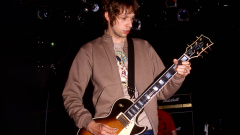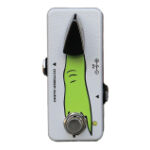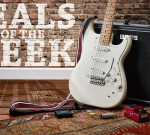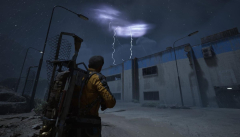- Features
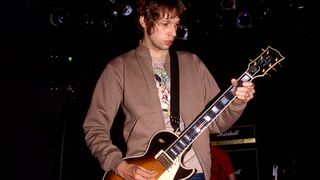
Before Andy Bell strode across grand stages with the U.K.’s most cocksure band, Oasis, he handled six-string duties for Ride, one of the shoegaze genre’s preeminent acts. Bands like Lush and Slowdive linchpinned shoegaze on the other side of the pond, but Ride’s first two records, Nowhere (1990) and Going Blank Again (1992), proved to be high points of the period.
Looking back on those records, Bell tells Guitar World, “I think there’s one moment that I remember that came after we finished Going Blank Again. When we finished that album, and it was mastered, [Ride guitarist] Mark [Gardener] and I drove back to Oxford, and he put it on his stereo at home. When we sat there and listened to Going Blank Again, we didn’t speak; we just listened.
“At the end, we were just like, ‘That is so good.’ But I don’t have a similar memory with Nowhere because, at the end, it was so stressful because we were hammering up against a deadline. The last days of Nowhere’s recording were chaotic; we worked night and day to mix it.
“But the guy who was supposed to mix it had a breakdown, which led us to call [producer] Alan [Moulder] to save the day. I don’t really remember having that same pleasurable playback moment with Nowhere where I said, ‘Ah, that’s a great record.’ I remember it being stressful.”
Stressful as it was, Ride’s greatness was painfully obvious, making it even more shocking that they didn’t last long. The group’s third record, Carnival of Light (1994), was a departure. And their fourth album, Tarantula (1996) – the final nail in the coffin before Ride’s breakup – while reminiscent of their earlier efforts, wasn’t enough to save the band in the face of dodgy relations and the looming shadow of Britpop.
Thinking back on Tarantula, Bell says, “I don’t think the songs on that album have the same feeling as the first two. But I’ll say this: Tarantula was an attempt to bring back the vibe of the earlier records. We started the Tarantula sessions soon after the Carnival of Light sessions because we were searching to get our vibe back. We could feel it slipping away; it was a last-ditch attempt to try and cook something up.
“A lot of those songs were not quite as ready as they should have been, but we wanted to try and capture a moment of spontaneity. But unfortunately, we didn’t. And I suppose those sorts of ideas can work, but they didn’t this time. And it wasn’t enough to save the band because it had already gotten away from us.”
Not long after Ride’s demise, Bell formed Hurricane #1, which he recalls as “The first time I was in a band that had very defined roles,” before revealing that “it was like a rebound,” where the objective was “to do the opposite”. And while Hurricane #1’s two albums – Hurricane #1 (1997) and Only the Strongest Will Survive (1998) – were memorable, when the call came to join his old friends Noel and Liam Gallagher in Oasis, Bell didn’t hesitate.
“It was interesting,” he says. “Because when Guigsy [bassist Paul McGuigan] and Bonehead [guitarist Paul Arthurs] left Oasis, it’s not like it was something I was privy to. There were no prior discussions leading up to that point. I had been reading about it in the music press like everybody else. So when the offer came about, it came completely out of the blue.”
After a quick audition and reorientation from guitar to bass, Bell was off and running with Oasis. Thankfully, though, his first shows as part of the band’s new lineup – now with Gem Archer on guitar – were smaller, allowing Bell to break in gently.
“I seem to recall [my first gig with Oasis] was in the States, although I don’t know exactly where,” he says. “We did a short tour at the end of ’99, where there were maybe four or five shows. It was a sort of radio-promoted tour or something to that effect. It was Oasis, Blink-182 and a few other bands. I can’t remember much more than that. But I know it was quick, and we only played maybe five songs in the set.”
For the next 10 years, Bell, along with the rest of the members of Oasis outside of Noel and Liam Gallagher, weathered critical, commercial and interpersonal storms. And while it wasn’t always easy, unlike most before him, Bell managed to earn the respect of his bandmates and became a steady contributor across Oasis’ final three studio records.
Of course, Oasis have been gone for nearly 15 years, while Ride are back together and stronger than ever. Beyond that, Bell has his solo work and his latest project, Mantra of the Cosmos.
“I don’t feel pressure to amalgamate my history into what I’m doing now,” Bell says. “We make tracks and look to find freedom in the music. And we also think people should be able to dance to it. Being creative and moving forward is essential to me. The alternative, I guess, is making music that’s not meaningful, which is not an option.”
He concludes, “But I don’t have anything against nostalgia, to be honest. When the time is right, I love the opportunity to celebrate an old album. Ride recently played Nowhere in full, and we did Going Blank Again, too. But I guess I’ve always had a forward-moving approach in life that always has me embracing the chance to play. Life is too short, and outside of family, the greatest satisfaction I get is doing different things, finding different lineups and getting out there with my friends again.”
Considering the success of Ride’s reunion – and Bell’s willingness to bridge gaps via song – one can’t help but wonder if he’d be up for hitting the stage with Oasis should their long-awaited reunion come to pass.
“Oh, absolutely,” Bell enthuses. “If that happens, I’m there for it, mate.”
As soon as I started playing Vapour Trail, I said, ‘Guys, listen to this. This is really good.’ And my next thought was, ‘How the fuck am I gonna remember it?’
After the release of 1990’s Nowhere, the media labeled Ride “the brightest hope for 1991”. Did that sort of pressure register at all?
“My reaction was, ‘Yeah, you’re fucking damn right we are.’ [Laughs] But we were full of confidence by the end of 1990. We’d only been going for around a year by that point and had really put the right foot forward with the three EPs we did, and then Nowhere.
“The songs we were writing were great, and we’d just been on an American tour, so we were cooking with gas. So we finished 1990 on a high note, and I remember seeing a lot of positive press about us, which fueled us going into the second album, Going Black Again.”
People often attribute Ride’s songs to Mark Gardener, but you wrote a ton, one being Vapour Trail, which, for my money, might be the best song on Nowhere. How did you put that together?
“Vapour Trail was one of those songs that came together very fast. The guitar line stands out; I remember exactly how it was written. We were on tour in the U.K., playing in small venues and staying in bed-and-breakfast hotels with a series of beds in the same ro

